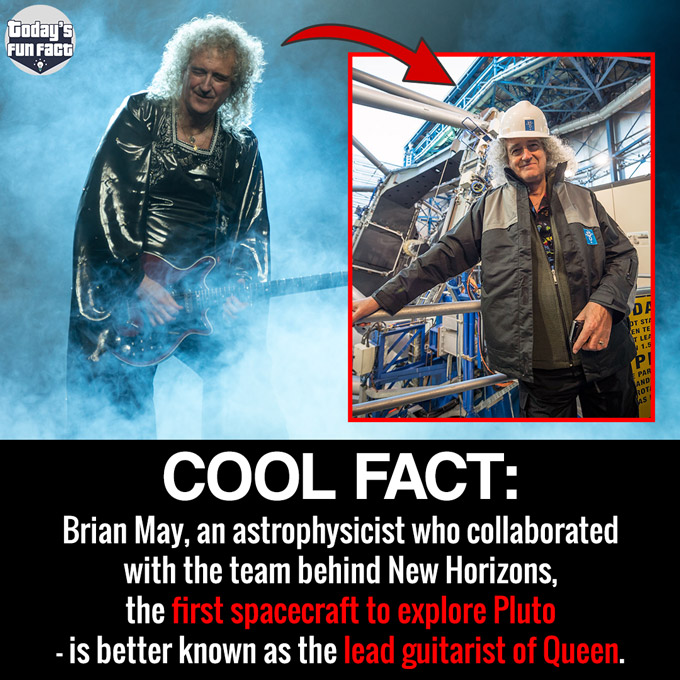
Brian May, Lead Guitarist Of Queen, Is Also A Prominent Astrophysicist Graphic © todaysfunfact.com. Background photo: Pixabay (PD)
Did you know Brian May—the legendary lead guitarist for the rock band Queen—holds a doctorate in astrophysics?
Most people recognize and admire Brian May for his illustrious four-decade music career. But a quick look at his social media shows the story of a man who holds a passion for deep space exploration and music in equal measure.
In 2015, his ‘side hustle’ in astrophysics earned him an invite from NASA to collaborate as the US Space agency’s New Horizons spacecraft made flybys of Pluto and a cosmic object dubbed Ultima Thule.
A History-Making Music Career
Saying Brian May has had a successful music career is an understatement. Most regard him as one of history’s greatest guitarists. According to the official Queen website, May’s performances and productions over the last few decades have “sold in excess of 100 million copies worldwide.”
As a songwriter for Queen, Brian is the creative force behind 22 hits, including the widely popular “We Will Rock You“ anthem. Beyond the rock band, he has enjoyed a respectable solo career—bagging a couple of awards along the way.
Exploring Deep Space as a Side Hustle
Music may be May’s legacy, but it was not his first career path. In the early 70s, before Queen, May was enrolled at the Imperial College in London studying astrophysics.
Speaking to Time, he recalled, “When I was about to finish my thesis, it was just the beginnings of Queen and I had to make that choice. And my choice was made on the assumption that I wasn’t very good at physics and I might be quite good at music.”
Decades later, May re-registered at Imperial College in London and finished his doctoral thesis. This decision later earned him a call to join the NASA team responsible for New Horizons’ reconnaissance of Pluto on July 14, 2015.
In an amusing case of two worlds colliding, the team at NASA came calling again as New Horizons made a new flyby on Jan 1, 2019, past Ultima Thule—the most distant target a human spacecraft has ever explored (4 billion miles from Earth). This time they needed May’s expertise as both an astrophysicist and musician.
Brian dabbled between working on stereoscopic imagery and data analysis for the flyby—and composing a song to capture the milestone achievement.
In a statement on his experience, May said, “For me, it’s been an exciting challenge to bring two sides of my life together—astronomy and music.”
